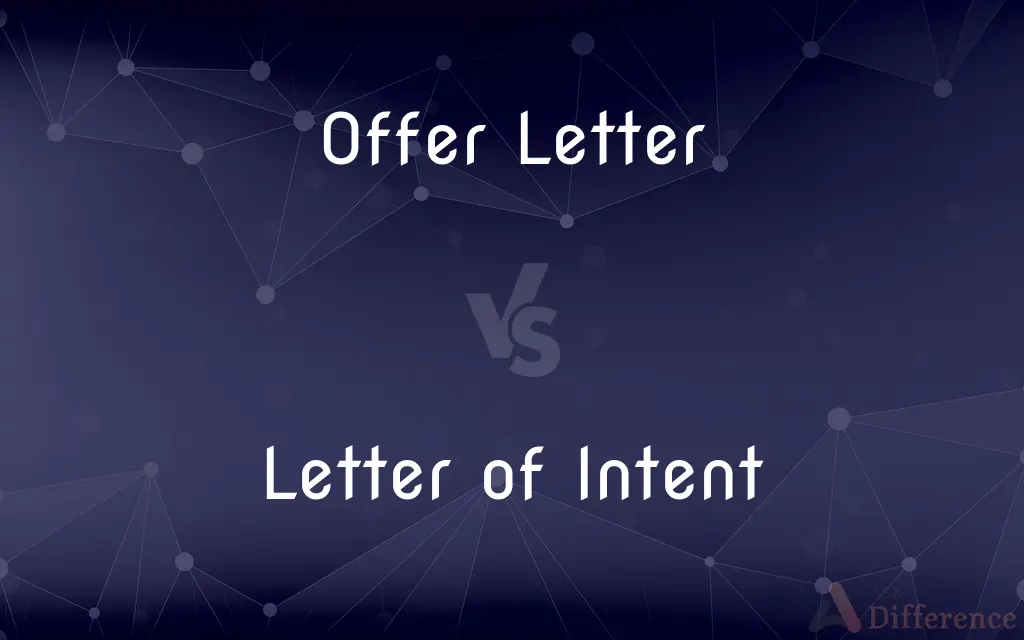Offer Letter vs. Letter of Intent — What's the Difference?
Edited by Tayyaba Rehman — By Fiza Rafique — Published on November 29, 2023
Offer Letter is a formal job proposal to a candidate, while Letter of Intent is a written statement expressing preliminary commitment in a professional context.

Difference Between Offer Letter and Letter of Intent
Table of Contents
ADVERTISEMENT
Key Differences
An Offer Letter is typically extended by employers to potential employees after a successful interview process. It usually outlines the terms of employment, including salary, job responsibilities, and other pertinent details. Conversely, a Letter of Intent often serves as a precursor to a formal agreement, indicating a mutual intention to enter into one at a later date. While it is not binding like an Offer Letter might be, it provides an understanding between the two parties.
The distinction between an Offer Letter and a Letter of Intent is primarily in their purposes and formalities. An Offer Letter is more concrete, serving as a definite proposal to the potential employee. In contrast, a Letter of Intent may be used in various contexts, such as business mergers or academic admissions, to show interest without the necessity of immediate commitment. Both documents are significant, but the Offer Letter leans towards finality, while a Letter of Intent suggests an ongoing conversation.
In the realm of job recruitment, receiving an Offer Letter is a hopeful sign for the job applicant, signifying that the employer is keen on hiring them. It stands as an official invitation to join a company. On the other hand, a Letter of Intent might be exchanged between two businesses intending to collaborate in the future or between a student and a university. Although it doesn’t guarantee finality, it’s an essential step in many negotiation processes.
While the Offer Letter's main focus is on the specifics of employment, a Letter of Intent leans more towards expressing an interest with potential details to be ironed out later. Both have their roles in professional settings, but they differ in their levels of commitment and the scenarios in which they’re employed.
Comparison Chart
Primary Purpose
To offer a job to a candidate
To express preliminary commitment in various professional contexts
ADVERTISEMENT
Binding Nature
Typically binding unless stated otherwise
Generally non-binding
Content
Specific details about job role, salary, benefits, etc.
General intention to collaborate, often with preliminary terms
Context of Use
Employment
Business deals, academic admissions, collaborations, etc.
Level of Commitment
Firm offer and commitment
Expression of interest with potential commitment later
Compare with Definitions
Offer Letter
A written invitation to join a company post-interview.
After three interviews, Jake finally received an Offer Letter.
Letter of Intent
A document expressing a desire to enter into an agreement.
The companies exchanged a Letter of Intent for the merger.
Offer Letter
An official document detailing employment terms.
The Offer Letter specified the start date and benefits package.
Letter of Intent
A non-binding statement indicating future collaboration.
The university sent a Letter of Intent, signaling interest in the research proposal.
Offer Letter
A formal job proposal from an employer.
Sarah was elated to receive an Offer Letter from the tech firm.
Letter of Intent
Preliminary terms before a formal agreement.
Before the contract, they drafted a Letter of Intent to outline the basics.
Offer Letter
A binding agreement outlining job specifics.
Before accepting, he decided to review the Offer Letter carefully.
Letter of Intent
A signifier of ongoing negotiations or discussions.
Their Letter of Intent was the first step towards the joint venture.
Offer Letter
An employer's commitment to hiring a candidate.
Receiving an Offer Letter confirmed Rosa's new position.
Letter of Intent
A written declaration of professional interest.
The athlete's Letter of Intent indicated his choice of college.
Common Curiosities
Is an Offer Letter legally binding?
Generally, an Offer Letter can be binding unless it specifically states otherwise, but local laws and the specific content of the letter play a role.
What is a Letter of Intent used for?
A Letter of Intent is used to express a preliminary commitment or interest in various professional scenarios, such as business collaborations or academic pursuits.
Can an Offer Letter be withdrawn?
Yes, employers can withdraw an Offer Letter, but there might be legal consequences depending on the jurisdiction and circumstances.
What is an Offer Letter in the context of employment?
An Offer Letter is a formal proposal from an employer to a potential employee detailing terms of employment.
Are the terms in a Letter of Intent final?
No, a Letter of Intent usually outlines preliminary terms, which can be negotiated or refined later.
What’s the difference between an Offer Letter and a contract?
While an Offer Letter specifies terms of employment, a contract is a more comprehensive legal document outlining detailed terms and conditions for both parties.
Can a Letter of Intent be considered a legal commitment?
Generally, a Letter of Intent is non-binding, but certain provisions in it can be binding, depending on the wording and intent.
Is it necessary to accept an Offer Letter immediately?
No, it's advisable to review the Offer Letter thoroughly, seek clarifications if needed, and then decide.
How detailed is an Offer Letter?
An Offer Letter usually contains specifics like job role, salary, benefits, start date, and other employment-related details.
Who typically issues a Letter of Intent?
A Letter of Intent can be issued by businesses, academic institutions, athletes, or any party expressing interest in a professional context.
What should one do after receiving a Letter of Intent?
After receiving a Letter of Intent, parties typically move to negotiate specific terms and formalize the agreement.
What should one do if they disagree with terms in a Letter of Intent?
Parties should communicate their concerns and negotiate terms before finalizing any agreement following a Letter
Share Your Discovery

Previous Comparison
New York vs. Chicago
Next Comparison
Baker’s Flour vs. Plain FlourAuthor Spotlight
Written by
Fiza RafiqueFiza Rafique is a skilled content writer at AskDifference.com, where she meticulously refines and enhances written pieces. Drawing from her vast editorial expertise, Fiza ensures clarity, accuracy, and precision in every article. Passionate about language, she continually seeks to elevate the quality of content for readers worldwide.
Edited by
Tayyaba RehmanTayyaba Rehman is a distinguished writer, currently serving as a primary contributor to askdifference.com. As a researcher in semantics and etymology, Tayyaba's passion for the complexity of languages and their distinctions has found a perfect home on the platform. Tayyaba delves into the intricacies of language, distinguishing between commonly confused words and phrases, thereby providing clarity for readers worldwide.
















































